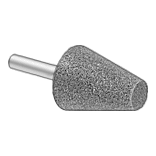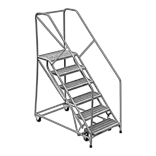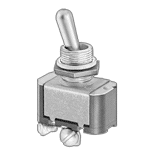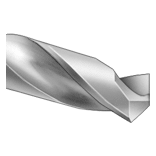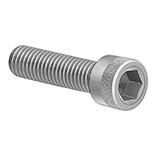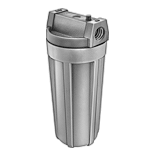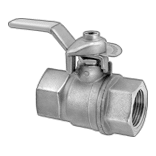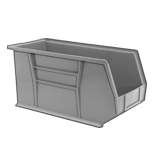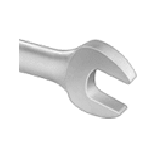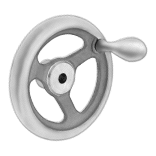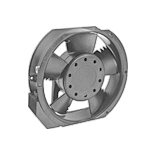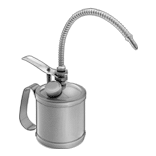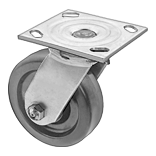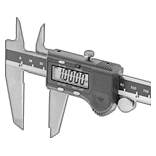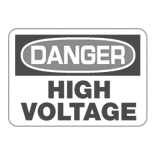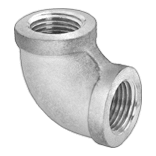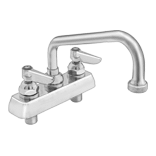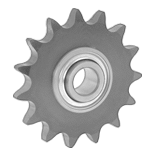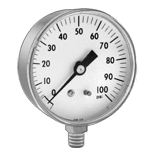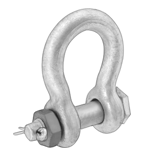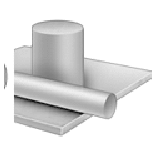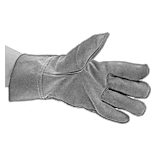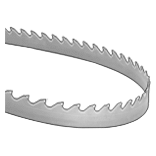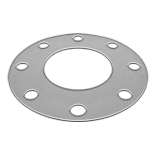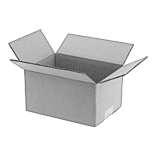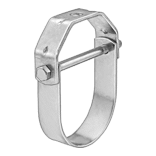About Roller Chain and Sprockets
More
High-Strength Corrosion-Resistant
Flat-Edge ANSI Roller Chain and Links




This treated steel chain has over six times the capacity of stainless steel chain. The flat edges of this chain create a level surface, so items riding on manufacturing and packaging lines won’t get caught in divots the way they do on standard roller chain. The links are also twice as long as standard roller chain, so they’re best for long drives and low- to moderate-speed applications. Use with standard sprockets with at least 24 teeth.
Connecting links are also known as master links. They're used to join the ends of a chain length. The side plate is easy to remove for attaching to a chain. Adding links are also known as roller links. They require two connecting links to join chain. Adding-and-connecting links are also known as half links and offset links. A combination of connecting and adding links, they can join chain that requires an odd number of links. The side plate is easy to remove for attaching to chain.
For technical drawings and 3-D models, click on a part number.
| Roller Chain Trade No. | Pitch | Roller Dia. | Roller Wd. | Working Load, lbs. | Each | |
Connecting Links | ||||||
|---|---|---|---|---|---|---|
Single Strand | ||||||
Corrosion-Resistant-Coated Steel | ||||||
| C2050 | 1 1/4" | 0.400" | 3/8" | 1,000 | 00000000 | 00000 |
Adding Links | ||||||
Single Strand | ||||||
Corrosion-Resistant-Coated Steel | ||||||
| C2050 | 1 1/4" | 0.400" | 3/8" | 1,000 | 00000000 | 0000 |
Adding-and-Connecting Links | ||||||
Single Strand | ||||||
Corrosion-Resistant-Coated Steel | ||||||
| C2050 | 1 1/4" | 0.400" | 3/8" | 1,000 | 00000000 | 0000 |
Corrosion-Resistant Flat-Edge ANSI Roller Chain and Links




Made of stainless steel, this chain has excellent corrosion resistance. The flat edges of this chain create a level surface, so items riding on manufacturing and packaging lines won’t get caught in divots the way they do on standard roller chain. Designed for long drives and low- to moderate-speed applications, its links are twice as long as those found on other roller chain. Use with standard sprockets with at least 24 teeth.
Connecting links are also known as master links. They're used to join the ends of a chain length. The side plate is easy to remove for attaching to a chain. Adding links are also known as roller links. They require two connecting links to join chain. Adding-and-connecting links are also known as half links and offset links. A combination of connecting and adding links, they can join chain that requires an odd number of links. The side plate is easy to remove for attaching to chain.
| Roller Chain Trade No. | Pitch | Roller Dia. | Roller Wd. | Working Load, lbs. | Each | |
Connecting Links | ||||||
|---|---|---|---|---|---|---|
Single Strand | ||||||
304 Stainless Steel | ||||||
| C2050-SS | 1 1/4" | 0.400" | 3/8" | 150 | 0000000 | 00000 |
Adding Links | ||||||
Single Strand | ||||||
304 Stainless Steel | ||||||
| C2050-SS | 1 1/4" | 0.400" | 3/8" | 150 | 0000000 | 0000 |
Adding-and-Connecting Links | ||||||
Single Strand | ||||||
304 Stainless Steel | ||||||
| C2050-SS | 1 1/4" | 0.400" | 3/8" | 150 | 0000000 | 00000 |
Flat-Edge ANSI Roller Chain and Links
The flat, oblong side plates on this chain make it ideal for conveying items in manufacturing and packaging lines.
Double-pitch chain has links that are twice as long as single-pitch chain links. It’s good for long drives and is lightweight. However, it operates at slower speeds than single-pitch chain. Use it with standard sprockets with at least 24 teeth.
Connecting links are also known as master links. They're used to join the ends of a chain length. The side plate is easy to remove for attaching to a chain. Adding links are also known as roller links. They require two connecting links to join chain. Adding-and-connecting links are also known as half links and offset links. A combination of connecting and adding links, they can join chain that requires an odd number of links.
For technical drawings and 3-D models, click on a part number.




Flat-Edge ANSI Roller Chain Attachment Links





Flat, oblong side plates make these links ideal for use with flat-edge ANSI roller chain. Add them to your roller chain to attach brackets or guides, or to move materials directly. Use them for conveying, timing, and aligning.
Connecting links are also known as master links. They're used to join the ends of a chain length. The side plate is easy to remove for attaching to a chain.
Adding links are also known as roller links. They require two connecting links to join chain.
For technical drawings and 3-D models, click on a part number.
| Roller Chain Trade No. | Working Load, lbs. | Tab Lg. | Mount. Hole Dia. | Each | |
A-1 | |||||
|---|---|---|---|---|---|
Tab Connecting Links—Steel | |||||
| C2050 | 1,000 | 0.594" | 0.203" | 0000000 | 00000 |
Tab Adding Links—Steel | |||||
| C2050 | 1,000 | 0.598" | 13/64" | 0000000 | 0000 |
K-1 | |||||
Tab Connecting Links—Steel | |||||
| C2050 | 1,000 | 0.594" | 0.203" | 0000000 | 0000 |
Tab Adding Links—Steel | |||||
| C2050 | 1,000 | 0.598" | 13/64" | 0000000 | 0000 |
SA-1 | |||||
Tab Connecting Links—Steel | |||||
| C2050 | 1,000 | 0.673" | 0.266" | 0000000 | 0000 |
SK-1 | |||||
Tab Connecting Links—Steel | |||||
| C2050 | 1,000 | 0.673" | 0.266" | 0000000 | 0000 |
